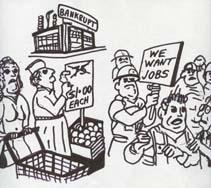“Why is there no money left?”
Contents: Introduction - Basic problem: interest - Consequence: a constant redistribution from poor to rich - Solutions! - Links - Quotes
„We can only overcome
the fear from a future we
are afraid of with pictures
from a future we want.“
Wilhelm Ernſt Barkhoff,
Initiator of the GLS Bank
Most of my input, discussion, and thought on the financial system is in German, but this page lists quite a few English sources as well. This whole page is not an exact translation of the German original, but uses different quotations and gives different (and less!) recommendations for further reading.
Introduction
How can there be “no more money left”? When I got my first pair of glasses, aged about 15 (in 1995), the glasses were completely paid for by (public) health insurance. A few years later the insurance first no longer paid the frames, then no longer gave any money at all. In 2005 the coalition of Social Democrats and Greens introduced tuition fees in my state (North-Rhine Westphalia). In 2009 my city’s household deficit reached a level where all “voluntary” expenses were forbidden by the district authorities - like for so many other cities and towns in the region. These are just three examples for the general tendency in Germany to steadily reduce the poorer people’s means of participation in society. In 2010 I finally found convincing answers to the paradox of steadily declining standards of living on the one side and ever increased productivity, record exports (“world champion” from 2003 to 2008), and decades without war and destruction (on German ground) on the other hand. Politicians and commentators like to blame “globalization” and the “demographic change” (which according to Google search results seems to be a term coined in Germany) for the deterioration, but neither of these explanations convince me. Instead I now hold our financial system responsible for it. The effects of this financial system were shown in the frequent newspaper headlines on financial crysis in 2010. In the beginning of 2011 this development continues: the US Secretary of the Treasury warns of an impeding government default on its dept - although the States are the only country in the world that can buy oil for self-printed paper. With the increasing age of our economies a basic defect of our financial system can less and less be compensated by taxes and social benefits:
Basic problem: ever positive interest
Something must give when the mathematics of interest-bearing debt overwhelms the economy’s ability to pay. For awhile the growing debt burden may be met by selling off or forfeiting property to creditors, but an active public policy response is needed to save the economy’s land and natural resources, mines and public monopolies, physical capital and other productive assets from being lost to creditors.
From Michael Hudson’s Why the “Miracle of Compound Interest” leads to Financial Crises (2007)
| $100 “invested” (or owed) at different interest rates | ||||||
| 1.00% | 2.00% | 3.00% | 5.00% | 7.00% | 10.00% | |
|---|---|---|---|---|---|---|
| 10 years | 110.46 | 121.90 | 134.39 | 162.89 | 196.72 | 259.37 |
| 20 years | 122.02 | 148.59 | 180.61 | 265.33 | 386.97 | 672.75 |
| 30 years | 134.78 | 181.14 | 242.73 | 432.19 | 761.23 | 1744.94 |
| 40 years | 148.89 | 220.80 | 326.20 | 704.00 | 1497.45 | 4525.93 |
| 50 years | 164.46 | 269.16 | 438.39 | 1146.74 | 2945.70 | 11739.09 |
| 60 years | 181.67 | 328.10 | 589.16 | 1867.92 | 5794.64 | 30448.16 |
| 70 years | 200.68 | 399.96 | 791.78 | 3042.64 | 11398.94 | 78974.70 |
| 80 years | 221.67 | 487.54 | 1064.09 | 4956.14 | 22423.44 | 204840.02 |
| 90 years | 244.86 | 594.31 | 1430.05 | 8073.04 | 44110.30 | 531302.26 |
| 100 years | 270.48 | 724.46 | 1921.86 | 13150.13 | 86771.63 | 1378061.23 |
| doubling in: | < 70 y | < 36 y | < 24 y | < 15 y | < 11 y | < 8 y |
Consequence: a constant redistribution from poor to rich
My Redistribution Calculator allows everyone to experiment with his or her own values for capital and interest!
Solutions!
Money requires the State, without a State money is not possible; indeed the foundation of the State may be said to date from the introduction of money.
Silvio Gesell in The Natural Economic Order (1920)
I chose this quote to show that the existing (i.e. produced by the European Central Bank, the Federal Reserve, or their respective counterparts) money needs not be accepted as “natural”. In fact it is just an agreement between men, which can be cancelled or modified.
I pin a lot of hope on a new money like the “Freigeld” Silvio Gesell describes it his book The Natural Economic Order. The full text of the book seems to be available online in English, French, German, Spanish, and Italian.
If Germany had a working circulation safeguard (Freigeld), the redistribution of money from poor to rich, as displayed above, would no longer exist. Instead there would be a slight redistribution from those holding a lot of cash to those living on less money. With my Freigeld Calculator you can immediately start playing with different values for the circulation safeguard!

Based on Silvio Gesell’s ideas (“on the shoulders of giants”) I developed the concept of an online market place with its own neutral money: freimarkt.org
I hope to be able to make this operational as soon as possible - or for someone else to implement the concept!
Links
- inequality.org provides very telling graphs on wealth inequality and income inequality in the US.
- Cyclos maybe already approximately provides what my Freimarkt is supposed to become: an internet market place with its own (optionally) circulation safeguarded currency. Several instances, but mostly small, regionally linked, and not open to everyone, already exist.
- Bob Marley - Rat Race “It’s a disgrace to see the human race in this rat race!”
- John Butler Trio - Revolution “All kicking and scrounging for the very first place / dictionary definition of a rat race”
- Beatles - Can’t Buy Me Love „I don’t care too much for money...“
- Michael Jackson - Money “You say you wouldn’t do it for all the money in the world? I don’t think so.”
- Tim Beam - The Ghost of my Money A video with nice pictures from the not too exciting movie „Der Geist des Geldes“ (The Spirit of Money).
 Larry Hannigan - The Earth Plus 5% strikingly explains why money at first was good for most people, but in the course of time made more and more of them fall into poverty. Thus our current money became the culprit for the worst of crimes, especially the constant wars. When you click the link to the story you also get to hear the text, if your computer supports sound. If English is not your preferred language there is an extensive list of translations available (albeit without the audio version): Bulgarian, Catalan, Czech, Dansk, English, Español, Francais, German, Italian, Japanese, Latvian Malay, Indonesian, Polski, Portugues, Russian, Serbo-Croatian, Turkish, and Urdu. Originally my link to this story was more prominent, but now I’m relatively convinced banks (except for central banks) don‘t actually create money, as the story states, so it has some flaws.
Larry Hannigan - The Earth Plus 5% strikingly explains why money at first was good for most people, but in the course of time made more and more of them fall into poverty. Thus our current money became the culprit for the worst of crimes, especially the constant wars. When you click the link to the story you also get to hear the text, if your computer supports sound. If English is not your preferred language there is an extensive list of translations available (albeit without the audio version): Bulgarian, Catalan, Czech, Dansk, English, Español, Francais, German, Italian, Japanese, Latvian Malay, Indonesian, Polski, Portugues, Russian, Serbo-Croatian, Turkish, and Urdu. Originally my link to this story was more prominent, but now I’m relatively convinced banks (except for central banks) don‘t actually create money, as the story states, so it has some flaws.- Money as Debt is a simple but thrilling documentary on the history and creation of our current money. It probably is not totally accurate when describing how banks would create money, but it delivers nice pictures for the effects of exponentially growing assets and debt. Alternatives to the current financial world order are also discussed on the website and in the film, which is freely available for download.
- Let’s make MONEY (IMDB entry) a calm, shocking, and great documentary with cineastic pictures.
- Life and Debt - A haunting documentary on what the policies of the IMF lead to.
Books
- Helmut Creutz - The Money Syndrome His book (that I read in the German original) is a very convincing and complete critique of money.
- Margrit Kennedy is a German professor for architecture who increasingly concentrates on a money reform. Her website contains links to books (notably “Interest & Inflation Free Money”, which is available online and which I read in German), presentations, and more.
- John S. Cooper - Zero the Dollar Crisis provides the setting for this 2010 thriller. According to internet sources the author is a German living in the States.
Quotes
The system of banking we have both equally and ever reprobated. I contemplate it as a blot left in all our constitutions, which if not covered, will end in their destruction, which is already hit by the gamblers in corruption, and is sweeping away in its progress the fortunes and morals of our citizens. [...] And I sincerely believe, with you, that banking establishments are more dangerous than standing armies; and that the principle of spending money to be paid by posterity, under the name of funding, is but swindling futurity on a large scale.
Thomas Jefferson (1743-1826), Third President of the United States, in a letter on republican government to philosopher John Taylor.
“Prime minister Jose Zapatero justified austerity by saying his ‘hands are tied’ by the financial markets. This has encouraged a widespread view that there is no real democracy in Spain.”
SocialistWorker online, 24 May 2011
The ideas of and the motivations for the monetary reform proposed on this website are related to the ideas behind a basic income guarantee - so I conclude by “quoting” a pictogram the Pirate Party Berlin uses to advertise the basic income guarantee: